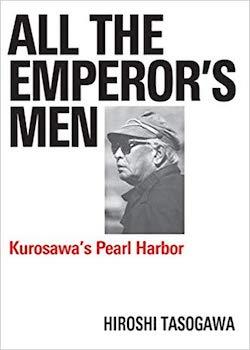All the Emperor’s Men

All the Emperor’s Men: Kurosawa's Pearl Harbour
By Hiroshi Tasogawa
Applause Books, November 2012
336 pages, ISBN 155783850X
Review by Michael Sullivan
In a career spanning over 50 years Akira Kurosawa (黒澤 明) directed over 30 movies, in all likelihood everyone has seen at least one of his movies, whether it is the epic Ran (乱) or the classic Seven Samurai (七人の侍). He was a huge influence on the history of cinema and in 1990 he was awarded the Academy Award for Lifetime Achievement. In this book Hiroshi Tasogawa details a period of Kurosawa’s life during which he was involved in the 20th Century Fox production of Tora Tora Tora(トラ・トラ・トラ). It was envisioned that this movie would tell the story of Pearl Harbor from a Japanese perspective and from an American perspective. However, when it came to shooting the movie Kurosawa was dismissed within weeks and the movie subsequently completed by different directors. In the months that followed it became clear that there was no clear answer to what had happened as different sources claimed that Kurosawa had been sick, hadn’t been sick, betrayed or even ousted by a Hollywood conspiracy.
Hiroshi Tasogawa graduated from Waseda University in 1958, he has been a reporter for NHK and the Associated Press, and was a professor of media at Tokai University. During the two years of Kurosawa’s involvement in Tora Tora Tora Tasogawa worked as an interpreter for Kurosawa as well as a translator of the screenplay. In this book he details the events of those years and attempts to shed light on why this partnership ultimately failed and why all those involved ended up with a different idea of what went wrong.
The book describes all the facts in vivid detail and serves as bit of a window into the mind of a great director like Kurosawa, it also considers the inherent miscommunication that can occur between two very different cultures such as the East and the West as well as how different methods of working can lead to great misunderstandings. A lot of the book details the build-up to the shooting of the movie and the amount of work put in by Kurosawa, as we follow events along two important facts become clear: Kurosawa saw this as a chance not only to present the Japanese version of events but also to present the tragedy of admiral Yamamoto (Commander-in-chief of the Japanese Navy), and that while Hollywood appreciated the films that Kurosawa had directed, they hadn’t actually done a lot of research on his work methods. This would prove to be a fatal flaw, especially when the producers and 20thCentury Fox representatives were faced with behaviour and shooting delays which seemed crazy. Further flaws in the partnership become clear when Tasogawa looks at the contract and reveals how what Kurosawa thought was his role and what 20thCentury Fox were actually expecting him to do were quite different on some very key points including overall direction, editing and even whether this was a co-production or a purely 20th Century Fox production.
This book describes in great detail the huge amount of work that had to be done before a movie could even reach the stage of shooting, it is a real revelation on aspects such as the screenplay, casting, budget and especially the heart and soul that Kurosawa put into it. It is a real page turner, and in particular the insight into Kurosawa’s character has left me wanting to watch his movies again in order to better understand the man behind the movie, and to watch Tora Tora Tora again in order to consider for myself what the movie might have been like with some of the cut scenes described in Tasogawa’s book, which within a Japanese perspective of the events that led up to Pearl Harbor would have presented Kurosawa’s depiction of the tragedy of admiral Yamamoto.
It seems that many problems can arise not only between two very different cultures using different languages, but also from a basic level between a director who was an artist and a film company that was a business. In the end the film Tora Tora Torawhich was completed didn’t include scenes that Kurosawa felt were key to the story and we can only wonder what could have been if he had managed to stay in the director’s chair. Tasogawa makes it clear that he can see the irony that a movie about the many misunderstandings that took place before and during Pearl Harbor would itself suffer a similar series of misunderstandings.
Note
Also see our earlier review of Hiroshi Tasogawa’s Japanese version of this book in Issue 17 (December 2008) “Kurosawa Akira vs. Hollywood. ” The Japanese book was very popular in and won several awards. Kurosawa Akira vs. Hollywood, by Hiroshi Tasogawa, Bungei Shunju, 2006, 486 pages, hardback ¥ 2476, ISBN-13: 978-4163677903, review by Fumiko Halloran

